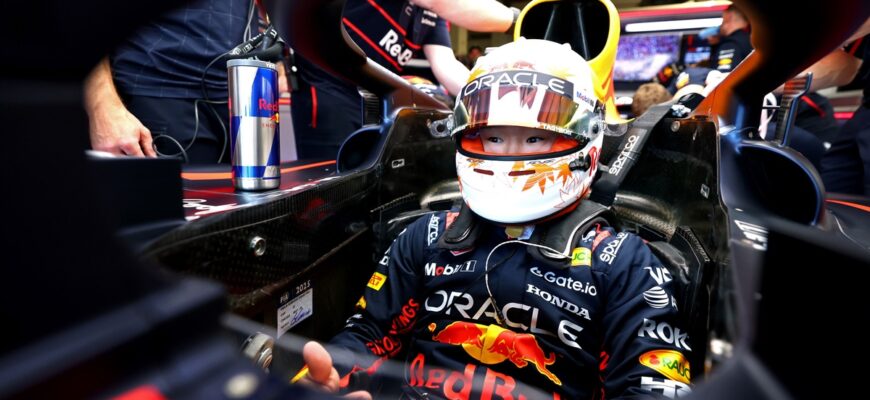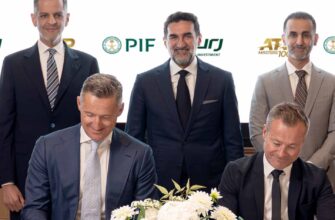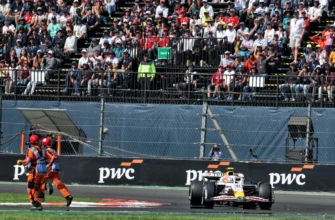Following Max Verstappen`s recent win for Red Bull at the Emilia Romagna Grand Prix, questions are again being raised about McLaren`s strategic decisions during the race weekend.
Verstappen overtook pole-position holder Oscar Piastri on the opening lap, but securing the victory still required significant effort. Lando Norris, in the other McLaren, soon moved past George Russell into third place.
Although Verstappen`s speed was perhaps unexpectedly high at Imola, McLaren`s strategy arguably simplified his path to victory with several key choices made during the race.
A primary point of contention was their early pit stop for Oscar Piastri on lap 13, despite him being less than three seconds behind Verstappen at the time. This decision effectively committed him to a two-stop race strategy.
This move proved disadvantageous. Other leading drivers, including Verstappen and Norris, extended their initial stints, finding unexpected tyre life and ultimately opting for a single pit stop. Meanwhile, Piastri lost valuable time navigating through slower cars.
McLaren then pitted Norris on lap 28, before Verstappen had stopped. Moments later, a Virtual Safety Car period began when Esteban Ocon`s car stopped on the track.
This timing was undoubtedly unfortunate and unpredictable for McLaren. However, the general principle dictates that drivers who stay out longer on track have a greater chance of benefiting from potential safety car periods by pitting under caution.
Consequently, Verstappen`s lead grew significantly, and he seemed poised for a comfortable win, with Norris and Piastri trailing substantially.
Yet, a subsequent incident – Kimi Antonelli`s Mercedes stopping due to a technical issue – brought out the full Safety Car, offering McLaren a renewed opportunity to challenge Verstappen.
Holding an advantage of over a pit-stop duration on Norris, Verstappen made his stop from the lead. Norris pitted on the following lap.
However, Piastri remained on track, coming out ahead of Norris. He was now leading his teammate but on hard compound tires that were 16 laps older than Norris` fresh set.
It was highly improbable that Piastri, with older tires, could challenge Verstappen, who also had new tires. Conversely, it seemed almost certain that Norris would overtake his teammate within the final 10 laps.
Given this situation, McLaren could have instructed Piastri to let Norris pass, allowing him to potentially challenge Verstappen in the final laps. They chose not to.
Villeneuve: McLaren Demonstrated Weakness
Ultimately, Norris passed Piastri for second place, and Verstappen secured a comfortable victory. Former F1 world champion and analyst Jacques Villeneuve criticized McLaren`s choices, suggesting they showed a lack of assertiveness.
According to Villeneuve, “They show weakness. Fundamentally, they lack the decisiveness that Red Bull consistently demonstrates year after year.”
He added, “It appears they are hesitant to be aggressive in pursuing the Drivers` Championship and reluctant to make calls that might disadvantage Piastri. It`s quite peculiar.”
Villeneuve commented on the race start, saying, “Piastri fumbled the first corner; he wasn`t sharp enough. He shouldn`t have lost the lead there. Later, his pace was surprisingly lacking compared to Norris, who was clearly faster.”
Regarding the Safety Car restart, Villeneuve stated, “McLaren surely knew Norris would overtake Piastri within a few laps due to the tyre difference. It was inevitable.”
“He was guaranteed to get ahead,” Villeneuve argued. “So why waste three laps before letting him challenge Verstappen?”
The outcome saw Verstappen extend his lead in the driver standings, while Norris`s second place finish helped him gain points on both Verstappen and his teammate Piastri.
Villeneuve elaborated, “Verstappen is the main championship contender. You shouldn`t make it easier for him to win, as that earns him more points towards the Drivers` title.”
He felt McLaren seemed content with finishing second and third. “McLaren now has a car capable of finishing first and second on a good weekend. Anything less is somewhat disappointing. First and third is fairly acceptable, but they appeared satisfied with second and third.”
“This hesitancy is also visible in their strategy,” Villeneuve continued. “When Norris extended his stint, why pit him prematurely?”
“They decided to keep him out longer. His pace was still strong, so why pit slightly early? It suggests a fear of fully committing.”
He also noted, “They didn`t capitalize on the Virtual Safety Car opportunity. While the later full Safety Car ultimately negated the effect, it still highlighted a lack of aggressive intent.”
Norris and Stella Defend Team`s Strategy
While allowing Norris past Piastri could have improved McLaren`s chances of winning, it`s understood that Piastri would naturally be reluctant to concede a position that impacts his own standing relative to his teammate in the championship battle.
Lando Norris seemed supportive of the team`s approach, stating the pit wall did “a good job”.
Norris commented, “I was on better tyres, but I didn`t expect anything easy. It was a hard battle, especially close in Turn One. That`s how racing should be, of course.”
“We both lost time battling,” he explained, “but that`s necessary when you`re competing for a championship.”
He added, “Trying to please one driver inevitably displeases the other; that`s the reality.”
“I believe the team managed it well,” Norris concluded.
McLaren Team Principal Andrea Stella confirmed that the possibility of ordering a driver swap was considered but ultimately dismissed.
“It was certainly something we thought about,” Stella stated.
“We wanted Oscar to have his chance at the restart,” he explained. “Our logic was that if Lando had the pace to challenge Max, he should be able to pass Oscar fairly easily given Oscar was on significantly older tires.”
“Realistically, if the pace difference was sufficient, the situation would resolve itself naturally. We`re content with how it played out.”
“Both drivers feel it was fair, and that`s our approach to racing,” Stella concluded.
Jamie Chadwick: Too Early for Team Orders
Three-time W Series champion and F1 analyst Jamie Chadwick suggested that it is too early in the season for McLaren to issue team orders, as doing so could negatively impact team harmony.
“It`s a situation with two potential number one drivers,” Chadwick observed. “There isn`t a clear leading driver. If Red Bull had someone as talented as Max, they`d likely face similar dilemmas.”
“Having two strong drivers contending for the championship is a positive issue, as we`ve noted,” she continued. “However, they cannot introduce team orders so early that it creates significant tension between the drivers.”
“It`s a delicate situation,” Chadwick remarked. “I anticipate there will be conflicts eventually; it`s almost predictable. Today`s race saw moments where it got close.”
“When those clashes occur, McLaren will need to manage them,” she stated. “Until then, I believe they are handling the team dynamic well.”
“Max outperformed them today, which is something we`ve come to expect, and the race outcome reflected that,” she concluded.






